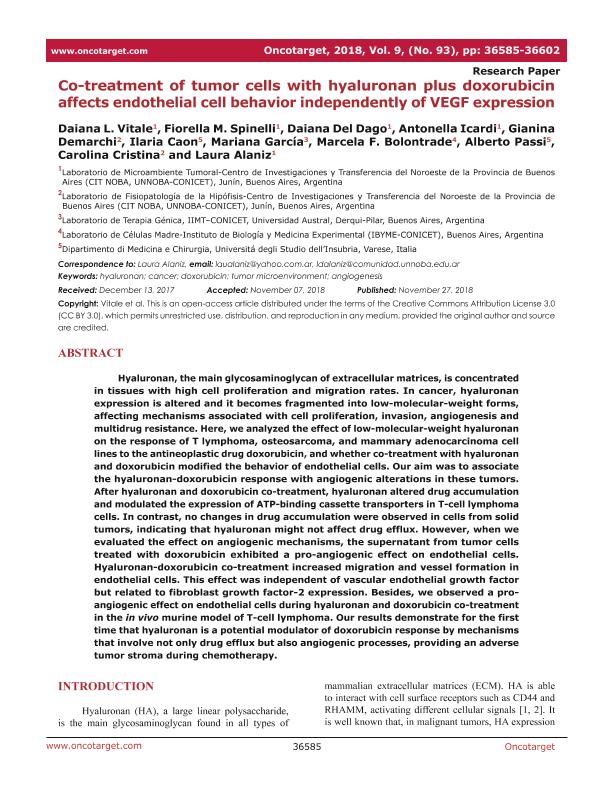Artículo
Co-treatment of tumor cells with hyaluronan plus doxorubicin affects endothelial cell behavior independently of VEGF expression
Vitale, Daiana Luján ; Spinelli, Fiorella Mercedes
; Spinelli, Fiorella Mercedes ; del Dago, Daiana Alejandra Ayelén; Icardi, Antonella; Demarchi, Gianina
; del Dago, Daiana Alejandra Ayelén; Icardi, Antonella; Demarchi, Gianina ; Caon, Ilaria; García, Mariana Gabriela
; Caon, Ilaria; García, Mariana Gabriela ; Bolontrade, Marcela Fabiana
; Bolontrade, Marcela Fabiana ; Passi, Alberto; Cristina, Carolina; Alaniz, Laura Daniela
; Passi, Alberto; Cristina, Carolina; Alaniz, Laura Daniela
 ; Spinelli, Fiorella Mercedes
; Spinelli, Fiorella Mercedes ; del Dago, Daiana Alejandra Ayelén; Icardi, Antonella; Demarchi, Gianina
; del Dago, Daiana Alejandra Ayelén; Icardi, Antonella; Demarchi, Gianina ; Caon, Ilaria; García, Mariana Gabriela
; Caon, Ilaria; García, Mariana Gabriela ; Bolontrade, Marcela Fabiana
; Bolontrade, Marcela Fabiana ; Passi, Alberto; Cristina, Carolina; Alaniz, Laura Daniela
; Passi, Alberto; Cristina, Carolina; Alaniz, Laura Daniela
Fecha de publicación:
11/2018
Editorial:
Impact Journals
Revista:
Oncotarget
ISSN:
1949-2553
Idioma:
Inglés
Tipo de recurso:
Artículo publicado
Clasificación temática:
Resumen
Hyaluronan, the main glycosaminoglycan of extracellular matrices, is concentrated in tissues with high cell proliferation and migration rates. In cancer, hyaluronan expression is altered and it becomes fragmented into low-molecular-weight forms,affecting mechanisms associated with cell proliferation, invasion, angiogenesis and multidrug resistance. Here, we analyzed the effect of low-molecular-weight hyaluronan on the response of T lymphoma, osteosarcoma, and mammary adenocarcinoma cell lines to the antineoplastic drug doxorubicin, and whether co-treatment with hyaluronan and doxorubicin modified the behavior of endothelial cells. Our aim was to associate the hyaluronan-doxorubicin response with angiogenic alterations in these tumors. After hyaluronan and doxorubicin co-treatment, hyaluronan altered drug accumulation and modulated the expression of ATP-binding cassette transporters in T-cell lymphoma cells. In contrast, no changes in drug accumulation were observed in cells from solid tumors, indicating that hyaluronan might not affect drug efflux. However, when we evaluated the effect on angiogenic mechanisms, the supernatant from tumor cells treated with doxorubicin exhibited a pro-angiogenic effect on endothelial cells.Hyaluronan-doxorubicin co-treatment increased migration and vessel formation inendothelial cells. This effect was independent of vascular endothelial growth factor but related to fibroblast growth factor-2 expression. Besides, we observed a proangiogenic effect on endothelial cells during hyaluronan and doxorubicin co-treatment in the in vivo murine model of T-cell lymphoma. Our results demonstrate for the first time that hyaluronan is a potential modulator of doxorubicin response by mechanisms that involve not only drug efflux but also angiogenic processes, providing an adverse tumor stroma during chemotherapy.
Palabras clave:
HYALURONAN
,
CANCER
,
DOXORUBICIN
,
TUMOR MICROENVIRONMENT
,
ANGIOGENESIS
Archivos asociados
Licencia
Identificadores
Colecciones
Articulos(IIMT)
Articulos de INSTITUTO DE INVESTIGACIONES EN MEDICINA TRASLACIONAL
Articulos de INSTITUTO DE INVESTIGACIONES EN MEDICINA TRASLACIONAL
Articulos(SEDE CENTRAL)
Articulos de SEDE CENTRAL
Articulos de SEDE CENTRAL
Citación
Vitale, Daiana Luján; Spinelli, Fiorella Mercedes; del Dago, Daiana Alejandra Ayelén; Icardi, Antonella; Demarchi, Gianina; et al.; Co-treatment of tumor cells with hyaluronan plus doxorubicin affects endothelial cell behavior independently of VEGF expression; Impact Journals; Oncotarget; 9; 93; 11-2018; 36585-36602
Compartir
Altmétricas



